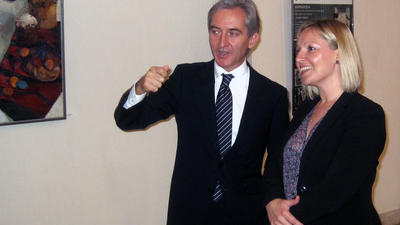-
Our work
-
Fields of work
- Arms control
- Border management
- Combating trafficking in human beings
- Conflict prevention and resolution
- Countering terrorism
- Cyber/ICT Security
- Democratization
- Economic activities
- Education
- Elections
- Environmental activities
- Gender equality
- Good governance
- Human rights
- Media freedom and development
- Migration
- National minority issues
- Policing
- Reform and co-operation in the security sector
- Roma and Sinti
- Rule of law
- Tolerance and non-discrimination
- Youth
- Field operations
- Projects
-
Meetings and conferences
- Summit meetings
- Review Conferences
- Ministerial Council meetings
- Plenary meetings of the Permanent Council
- Plenary Meetings of the Forum for Security Co-operation
- Security Review Conferences
- Annual Implementation Assessment Meetings
- Economic and Environmental Forum
- Economic and Environmental Dimension Implementation Meetings
- Human rights meetings
- Media conferences
- Cyber/ICT security conferences
- Conference of the Alliance against Trafficking in Persons
- Gender equality conferences
- Annual OSCE Mediterranean conferences
- Annual OSCE Asian conferences
- Partnerships
-
Fields of work
-
Countries
- All
-
Participating States
- Albania
- Andorra
- Armenia
- Austria
- Azerbaijan
- Belgium
- Belarus
- Bosnia and Herzegovina
- Bulgaria
- Canada
- Croatia
- Cyprus
- Czechia
- Denmark
- Estonia
- Finland
- France
- Georgia
- Germany
- Greece
- Holy See
- Hungary
- Iceland
- Ireland
- Italy
- Kazakhstan
- Kyrgyzstan
- Latvia
- Liechtenstein
- Lithuania
- Luxembourg
- Malta
- Moldova
- Monaco
- Mongolia
- Montenegro
- The Netherlands
- North Macedonia
- Norway
- Poland
- Portugal
- Romania
- Russian Federation
- San Marino
- Serbia
- Slovakia
- Slovenia
- Spain
- Sweden
- Switzerland – OSCE Chairpersonship 2026
- Tajikistan
- Türkiye
- Turkmenistan
- Ukraine
- United Kingdom
- United States of America
- Uzbekistan
- Asian Partners for Co-operation
- Mediterranean Partners for Co-operation
-
Structures and institutions
- Chairpersonship
-
Secretariat
- Secretary General
- Office of the Secretary General
- Conflict Prevention Centre
- Transnational Threats Department
- Office of the Special Representative and Co-ordinator for Combating Trafficking in Human Beings
- Office of the Co-ordinator of OSCE Economic and Environmental Activities
- Gender Issues Programme
- Opportunities for Youth
- Department of Human Resources
- Department of Management and Finance
- Office of Internal Oversight
- Documentation Centre in Prague
- Institutions
-
Field operations
- Presence in Albania
- Centre in Ashgabat
- Programme Office in Astana
- Programme Office in Bishkek
- Mission to Bosnia and Herzegovina
- Programme Office in Dushanbe
- Mission in Kosovo
- Mission to Moldova
- Mission to Montenegro
- Mission to Serbia
- Mission to Skopje
- Project Co-ordinator in Uzbekistan
- Closed field activities
- Parliamentary Assembly
- Court of Conciliation and Arbitration
- Organizational structure
- About us
Press release
In Moldova, OSCE Chairmanship representative calls for further progress in Transdniestrian conflict negotiations

- Date:
- Source:
- OSCE Chairpersonship
- Fields of work:
- Conflict prevention and resolution
CHISINAU, 20 September 2012 - The Representative of the Irish Chair-in-Office of the OSCE, Minister for European Affairs Lucinda Creighton, visiting Moldova today emphasized the need to maintain momentum in the negotiations on a political settlement of the Transdniestrian conflict.
In Chisinau she met Moldova’s President Nicolae Timofti, Prime Minister Vlad Filat, Deputy Prime Minister for Reintegration Eugene Carpov and Minister of Foreign Affairs and European Integration Iurie Leanca. Today she also traveled to Tiraspol to meet Transdniestrian chief negotiator Nina Shtanski.
“I am encouraged by the progress we have seen this year, notably the agreement on the principles and procedures for the conduct of negotiations, and on the agenda for the process,” said Creighton. “We have seen some positive developments on the ground as well, including the re-opening of rail freight traffic through Transdniestria and the disposal of radioactive waste."
Welcoming the recent agreement to intensify dialogue on human rights issues as well as to establish a joint forum for dialogue with civil society and media from both sides, Creighton underlined that these achievements were possible thanks to the sides’ political will and positive approach towards reaching a consensus.
“With this positive and constructive approach there could also be progress on issues concerning freedom of movement and resolution of problems facing Moldovan-administered schools in Transdniestria,” she said. “In both my roles representing the OSCE Chairmanship and the incoming EU Presidency I urge the sides to agree on the re-opening of the Gura Bicului bridge for vehicle traffic. This bridge was renovated by the EU more than 10 years ago and it is high time that this important connection between both banks of the river is restored.”
During her visit Creighton stressed the important work done by the OSCE Mission to Moldova in facilitating the negotiations in the 5+2 format and building confidence between the sides.
The 5+2 process towards a Transdniestrian settlement includes the representatives of the sides, mediators and observers in the negotiation process – Moldova, Transdniestria, the OSCE, the Russian Federation, Ukraine, the US and the EU.